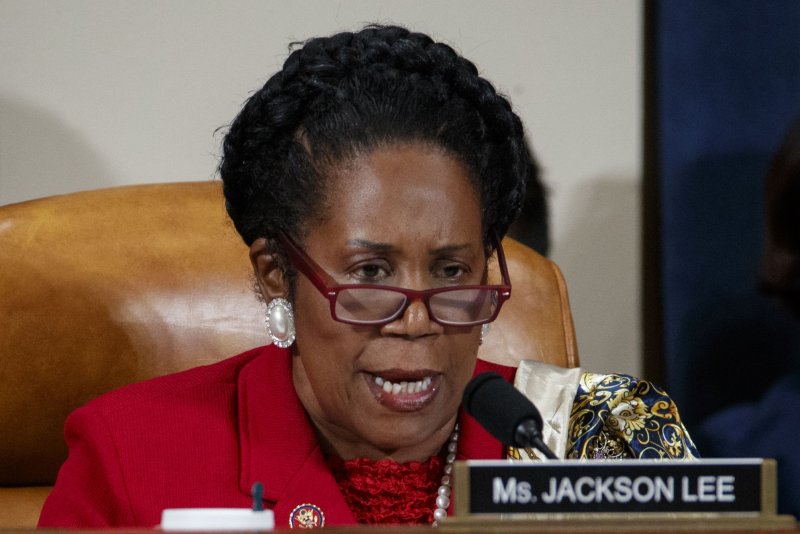
House judiciary committee member Sheila Jackson Lee urged Republicans on Wednesday to vote in favor of her bill to create a commission to study the lasting effects of slavery. File Photo by Shawn Thew/UPI | License Photo
April 15 (UPI) -- A House committee approved legislation late Wednesday to pave the way to pay reparations to ancestors of enslaved Black Americans, though the bill has an uphill battle to become law.
The House judiciary committee voted along party lines 25 to 17 in favor of bill H.R. 40 that would establish a 13-member commission to study the history and effects of slavery in the United States and its colonies from 1619 to 1865, as well as the ensuing discrimination, aiming to recommend remedies, including reparations.
The bill was first introduced nearly three decades ago by the late Rep. John Conyers, D-Mich., and was named after the 40-acre plots of land Gen. William T. Sherman promised in 1865 to redistribute to formerly enslaved people.
Committee Chairman Jerry Nadler, D-N.Y., described the bill before the vote Wednesday as "historic legislation" that does not mandate financial payments nor recommend how to properly atone for the legacy of slavery -- it intends to begin a conversation about the mistreatment of Black people in the United States.
RELATED Judge rules Harvard owns slave images, not descendants
"This moment of national reckoning comes at a time when our nation must find constructive ways to confront a rising tide of racial and ethnic division," he said. "Reparations in the context of H.R. 40 are ultimately about respect and reconciliation -- and the hope that one day all Americans can walk together toward a more just future."
Rep. Sheila Jackson Lee, D-Texas, who reintroduced the bill, told her colleagues across the aisle to not ignore the pain and history of Black people in the United States and the reasonableness of the commission.
"The goal of this historical commission and its investigation is to bring American society to the new reckoning of how our past affects the current conditions of African Americans and make America a better place to help and truly study the disadvantage," she said. "The reparations moment does not focus only on payments, but it focuses on remedies that can be created in many forms necessary to equitably address the many kinds of injuries sustained from the chattel slavery and its continuing vestiges."
RELATED Chicago suburb approves housing reparations for Black residents
To focus on financial reparation is an "empty gesture," she argued, stating they only want others to see the pain, violence and brutality Black Americans have experienced to create a pathway to reconciliation.
Rep. Chip Roy, R-Texas, said the bill would put the country on the wrong track.
"We have utterly destroyed Black families. We have utterly ripped fathers and people that children should be able to look up to in their families from the homes of Black families in the name of government paternalism," he said. "And that, I'm afraid, is where this kind of legislation takes us -- it takes us away from the important dream of judging people by the content of their character and not by the color of their skin."
RELATED New California law forms panel to examine reparations for slavery
The bill has not been advanced to a floor vote, but it has received support from President Joe Biden, whose press secretary, Jen Psaki, told reporters in February that he would be in favor of such a commission.
"He certainly would support a study of reparations," she said, stopping short of saying he'd sign it if it landed on his desk, adding they would wait to "see what happens through the legislative process."
The vote on the bill came less than a month after Evanston, Ill., a Chicago suburb, approved legislation to make available hundreds of thousands of dollars to right decades of wrongs committed by the city's discriminatory housing practices against its Black residents as part of a reparations program.
(0) Leave a comment
upi.com/7090451











